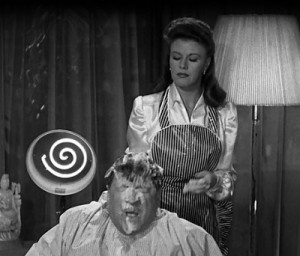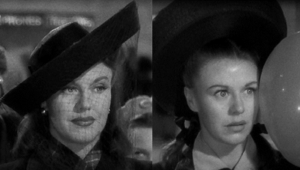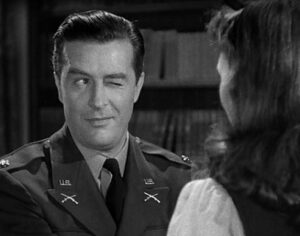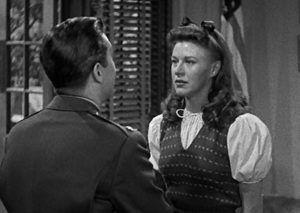
Those born in the age of streaming will never know the excitement of catching a favorite film on TV, running to get a tape on time to record it, and succeeding. With adept timing skills, one could even cut out the commercials. There were a few films I loved so much that I was willing to record them even if I had missed a significant portion of the start; What about Bob? was one of them. (40 minutes of a Bill Murray flick is still 40 minutes of Bill Murray.) But my favorite of those I only partially caught was Billy Wilder’s Hollywood directorial debut, The Major and the Minor. After a decade of watching the film from 25 minutes in due to a tardy discovery of it on TCM, and even tardier taping effort, I finally viewed the whole movie, and discovered it was even more charming than I’d thought.
The film begins when Susan Applegate (Ginger Rogers), fed up with New York, tries to head home to Iowa, only to find the train fare back has increased and she can’t afford it. Faced with the prospect of more skirt chasing and job changing, Susan pretends she’s a kid to get the half-price fare instead.
Since this is a Wilder film, you know her ruse will lead to trouble. The train conductors, suspicious of her maturity, keep trying to catch Susan—asking her birthdate, spying on her reading material, looking her up and down. Finally, they spot her during an inadvisable smoking break. She escapes being thrown off by running into the berth of Major Kirby (Ray Milland), an instructor for a military academy. Kirby believes her kid routine and lets her stay in his other bed, but when the train stops due to bridge trouble, his fiancé, Pamela (Rita Johnson), drives up to see him and catches Susan. More clear-sighted than her husband-to-be, Pamela assumes Susan an adult and heads back to the school to get him fired.
Of course, Kirby beseeches Susan to visit his academy (as Sue Sue, her alter ego) while the train is delayed to prove his innocence, and Susan, moved by his sweetness and guilty at what she’s caused, agrees. So now there’s a woman pretending to be a child at a military school full of boys who might question her age, but have no doubts whatsoever about her attractiveness. You can imagine the kind of scenarios that ensue.
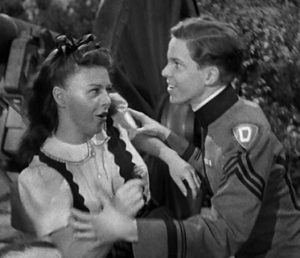
In my favorite moment, Rogers uses her dancing skill to lure a cadet off the phone long enough to assist Kirby’s efforts to get back into active military service, plans Pamela has secretly been trying to derail.
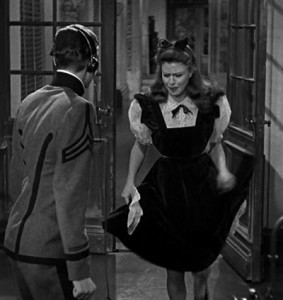
Of course, there are some questions here. Already in her thirties, Rogers looks about as likely to pass for 12 as I would for a toddler. Her childish voice does indeed sound like “Baby Snookums,” as she later admits, making you wonder whether Susan has ever encountered an actual twelve-year-old; that voice has to be a good seven years off. At first, I just considered the choice of Rogers bad casting; a frailer woman with a delicate voice might have pulled off a more convincing pre-adolescent than an actress with such a deep timbre and womanly shape.
But like Barbara Stanwyck’s appalling British accent in The Lady Eve, you begin to view Rogers’ very implausibility as part of the humor.
Despite the audience’s likely doubts about this community being so taken in by a woman who does not look or talk like a twelve-year-old, the depiction of their wholesomeness is so consistent throughout the movie that you soon forget your skepticism. This is a community, after all, in which the school administration and Kirby’s fiancée plot to fire him for sleeping in the same berth with a full-grown woman, but react this way to finding out Susan is a child:
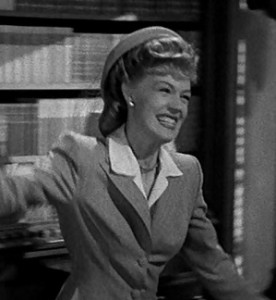
Throughout the movie, writers Charles Brackett and Wilder sidestep the scarier possibilities suggested by an older man-kid relationship by making those possibilities beyond the imaginations of people at this school. Therefore, in spite of Milland’s attention to Sue Sue, he never comes across as threatening or creepy, as heroes in other films with similar stories have, such as 1999’s Never Been Kissed. In fact, Milland plays the part of an avuncular type so well that it took about four films more of his work for me to actually recognize that he was attractive at all (this in spite of the great range of his roles, including his Oscar-winning performance as an alcoholic on a binge, Wilder’s The Lost Weekend.)
Predictably, the only one to discover the truth about the imposter’s age is the same age herself: Pamela’s sister, Lucy (Diana Lynn). Lucy is a great character, a budding scientist whose knowledge of human maturation would have made her perceive Sue Sue’s act even if her clothing hadn’t given it away. The two quickly become allies in separating Kirby from the unlikable Pamela.
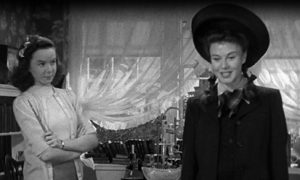
Once over the shock of Rogers playing a child, you start to realize just how marvelous she is in the role. She’s so convincingly jaded by her New York disappointments, a cynicism that comes out in an impeccable delivery of the screenwriters’ marvelous lines. Her dawning love for Kirby is equally convincing. Just as Rogers is said to have persuaded all of America that Fred Astaire was a sexy catch, so here she persuades us all that there is nothing more lovable than a guy who is trying to help a kid adjust to the pangs of early adolescence.
I definitely missed a little of the plot by re-watching my taped version of this movie for so many years, but I wasn’t wrong about the film’s quality. Whether watching five minutes or a 100, you’ll enjoy it too.

